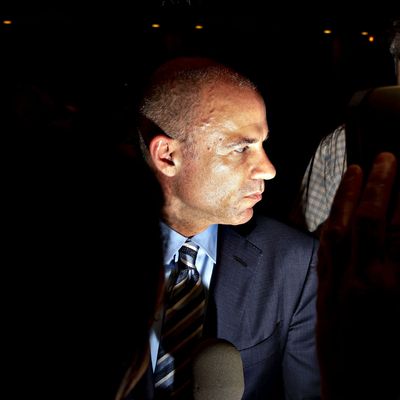
Michael Avenatti’s dream of running for president as a Democrat was never going to end in anything other than total humiliation. This reality has finally dawned upon Avenatti himself, who made his departure from the race official. The more interesting question is why anybody thought a totally unqualified plaintiff’s lawyer stood any chance in the first place.
The first act of Avenatti’s post-candidacy was to get into a Twitter beef with Nate Silver over whether he might have won, a choice that further reinforces the reasons why he wouldn’t have. But Avenatti might be forgiven his delusions. The still-incomprehensible events of 2015–2016 have left a wide array of commenters suggesting Democratic primary voters might well follow the Republican lead, dispense with the customary reasonably well-qualified public official as their standard-bearer, and instead nominate a brash television personality. Multiple opinion columns argued that Democrats should nominate either a novice long shot in general or Avenatti in particular, on precisely these grounds.
The premise of these claims is that the same basic rules that governed the Republican primary apply with equal force to the other party, and if a Democratic Trump has not materialized, it is only because none has yet dared to try. This badly misunderstands modern Democratic Party politics.
The progressive movement is a tradition in American politics that attempted to create order out of the messy mass Democratic spectacle of the 19th century. Progressives believed in a certain end — primary economic regulation — but also well-defined means: elections that could be free of graft, and elected officials who would be informed by disinterested experts. Progressivism took root in both parties at first. (Both Teddy Roosevelt and Woodrow Wilson were progressives.) Over time the progressive wing of the Republican Party has withered, while the progressive style has taken ever-deeper hold in the Democratic Party. Nearly every Democratic nominee starting with George McGovern, with Bill Clinton standing as perhaps the sole exception, promised to practice politics in a cleaner, more elevated, and intellectual way.
Democratic presidential debates tend to be highly wonky spectacles, with contenders jostling to display command of policy details. This poses a stark contrast to Republican debates, which — even before Trump came along — are generally barely disguised primate dominance rituals. Trump pulled the mask off the whole ruse by dispensing with even the pretense of knowing anything about policy and simply bullying his opponents, to the visible delight of the party’s voters.
The two parties operate in news environments that reflect their differences. Democratic candidates need to worry how their statements will be covered in the New York Times and on NPR, institutions that follow traditional journalistic norms (which also date back to the Progressive Era). Avoiding specifics with lies and bluster will result in disastrously bad coverage in the news outlets that matter. Republican candidates who blatantly lie and bully also risk disastrous coverage in those same organs — the difference is that it doesn’t matter to their voters what the Times says. Republicans only need to pay attention to how they play on Rush Limbaugh and Fox News, the journalistic values of which are, shall we say, different.
Avenatti’s short-lived candidacy was a disaster for multiple reasons, ranging from cringe-inducing gaffes to reported allegations of domestic violence. But even absent those setbacks, Avenatti never stood a chance, because the party he hoped to win over is simply not like the one that nominated Trump.






























